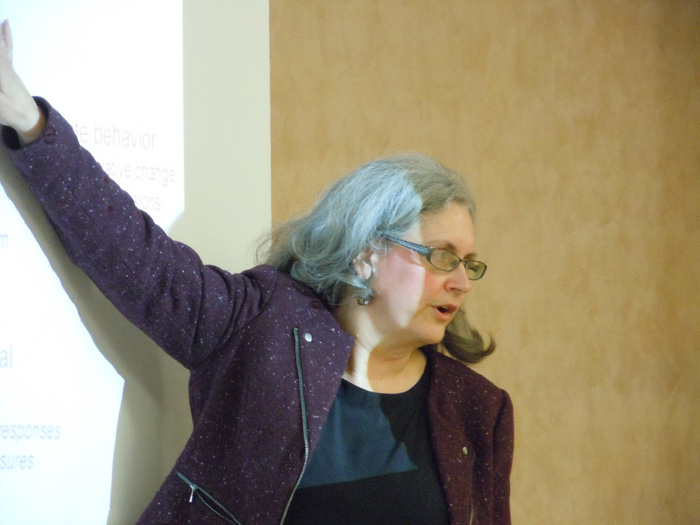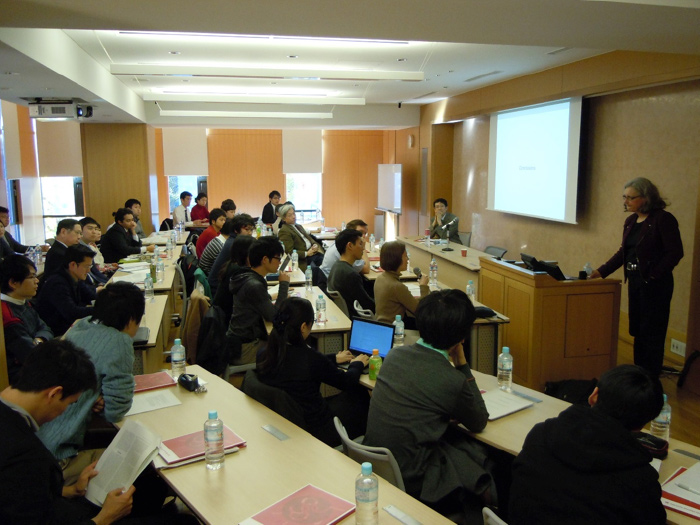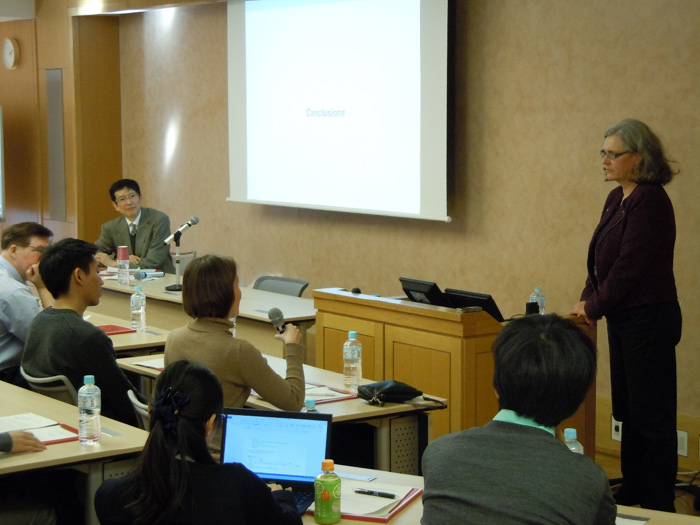SSU Forum with Professor Beth Simmons
| Date: | Wednesday, December 3, 2014, 13:00-14:30 |
|---|---|
| Venue: | Seminar Room, 3rd Floor, Ito International Research Center |
| Subject: | Indicators as Social Pressure in International Relations: The Case of Trafficking in Persons |
| Lecture: | Professor Beth Simmons (Clarence Dillon Professor of International Relations, Harvard University) |
| Language: | English |
| Hosted by: | Security Studies Unit, Policy Alternatives Research Institute, the University of Tokyo |
| Co-hosted by: | The Economy-Security Nexus |
The Security Studies Unit was delighted to host Beth Simmons, Clarence Dillon Professor of International Relations at Harvard University, who delivered a talk entitled “Indicators as Social Pressure in International Relations: The Case of Trafficking in Persons” in the framework of the SSU Forum.
The Forum was chaired by SSU member Professor Keisuke Iida, who introduced Professor Simmons by reminding the audience of her numerous contributions to the study of “soft power”, international law, international institutions and norms, and human rights.
After thanking Professor Iida, Professor Simmons immediately proceeded with the introduction of the topic. In the past two decades, with a dramatic acceleration in recent years, states (but also other organisations) have been subjected to an increasingly intense barrage of assessments of their performance. These assessments produce a variety of rankings, ratings, and other indicators, which are now to be found in almost every field: from financial performance to human rights violations, from environmental policies to corruption.

In a project developed together with Professor Judith Kelley (Duke University), Professor Simmons intends to promote a better understanding of this relatively new phenomenon, its implications and its possible future trajectories, focusing in particular on Global Performance Indicators (GPIs).
GPIs not only cover a very large spectrum of issues, but they also come from very diverse sources, and from different countries. The largest share of GPIs are produced by inter-governmental organisations, private institutions, non-governmental organisations, universities and/or think tanks, and by national governments. About half of GPIs are produced by organizations headquartered in the US, with European countries accounting for most of the other half, especially Britain, followed by Switzerland and Germany. Other nations still represent a small share of GPIs, and it will be interesting to see, Professor Simmons argued, whether there will be a shift in this distribution as countries may respond to the Western (especially US) dominance in this field, by producing their own GPIs.

Professor Simmons illustrated the importance of GPIs’ political implications. GPIs are not just monitoring tools, but they can also be seen impacting the international reputation of a state. This can potentially generate a number of consequences, as governments may design their policies in order to improve their ranking, or access to certain international programmes (e.g. aid) can be conditioned on the attainment of a certain performance. On the other hand, the very existence of GPIs and the way in which their performance evaluation is conducted has to be considered in its nature of political act. They can shape political competition and contestation.
In the second part of her talk, Professor Simmons used the issue of human trafficking to illustrate her point. The US government produces an annual report on this globally widespread phenomenon, the “Trafficking in Persons Report” (TIP), which includes a rating system of the world’s states in relation to their response to trafficking. The goal of the US government for the production of the report and the related “Tier” system is a political agenda, pressing for the worldwide criminalisation of human trafficking practices, and calling for national legislative changes, in order to combat the phenomenon.
Interestingly, as Professor Simmons has pointed out using a word cloud based on Wikileaks cables, the problem of human trafficking emerges as one of the key preoccupations of the US State Department in global politics. She has argued that the TIP may have an active role in changing the policies of governments of states where human trafficking is still not criminalised, by exercising pressures that affect their international reputation and standing, controlling for other factors as well.
Professor Simmons’ final remark highlighted that GPIs need to be considered and studied with greater attention by the IR academic community, in the broad context of the study of “soft power”, its creation and management at international level.

-
Clarence Dillon Professor of International Relations,
Harvard University
